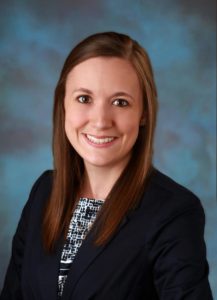On Point submissions are individual member viewpoints and not North Carolina Medical Society policy.

With the recent FDA approval of over-the-counter (OTC) hearing aids, individuals now have the option to purchase a new category of hearing aid without medical evaluation or professional guidance. Many people are excited about the prospect of increased access to lower cost hearing aids and the positive effects it may have on hearing health care. However, all hearing loss is not the same and the one-size-fits all model of over-the-counter products is not for everyone.
OTC hearing aids are for individuals with perceived mild to moderate hearing loss over the age of 18. Those with more severe hearing loss will still need to pursue hearing aids through a hearing care professional like an audiologist. However, most healthcare providers strongly urge everyone to complete a professional hearing exam especially before considering OTC. Research shows individuals struggle to accurately estimate their level of hearing loss. Most studies suggest that because age related hearing loss is typically slow and progressive, it is difficult for individuals to gauge their degree of hearing loss. Over or underestimating the degree of hearing loss can lead to inappropriate amplification levels which may result in further damage to the auditory system. It is also important to note some types of hearing loss can be medically managed, and others are related to more severe health conditions. These causes and conditions are likely to be missed if individuals are self-assessing their hearing loss. (Note: individuals should see their doctor immediately if they experience hearing loss that is worse in one ear, a sudden hearing loss, vertigo, or tinnitus in one ear, as these are signs of a possible medical problem)
Over-the-counter hearing aids are customizable or self-fit, meaning; consumers will be responsible for programming the devices and understanding how to appropriately use them. Although the FDA requires OTC manufacturers to provide information on how to handle repairs, manufacturers are not required to provide customer service for OTC devices over the phone. Without individualized fitting or access to support, there is concern that people utilizing OTC hearing aids will give up on hearing aids if they find little or no benefit from these devices. This is worrisome due to the many known health impacts of untreated hearing loss, which notably include increased risk of depression, dementia, and falls. Pursuing professionally fit hearing aids, such as those purchased through an audiologist, helps individuals avoid these concerns.
Audiologists are doctorate level professionals who are trained to evaluate, diagnose, and manage hearing loss. Using their professional knowledge, an audiologist programs and calibrates prescription hearing aids to a patient’s audiological needs. Continued services such as aural rehabilitation, cleaning, programing, and software updates along with continued monitoring of hearing loss help ensure increased acceptance and long-term success when utilizing the hearing aids. These services are typically included in the cost of prescription hearing aids which is one reason they have a higher price point than OTC hearing aids. Nevertheless, OTC hearing aids may be a good first step for those experiencing situational hearing difficulties and may help decrease the lingering stigma associated with hearing loss and hearing aids.
If individuals are considering OTC hearing aids, they should get a diagnostic hearing test first to ensure they are a proper candidate and rule out any medical concerns. It is also recommended to look for devices that offer trial or return periods in case OTC devices do not provide the needed or desired benefits. Finally, it is important to remember that hearing loss is progressive and requires continued monitoring and management. If difficulties with hearing and communication continue, consult with an audiologist to avoid the negative long-term effects that untreated hearing loss has on one’s overall health and wellbeing.
Dr. Mooney is the lead Audiologist at Carolina Ear, Nose and Throat in Hickory, NC
